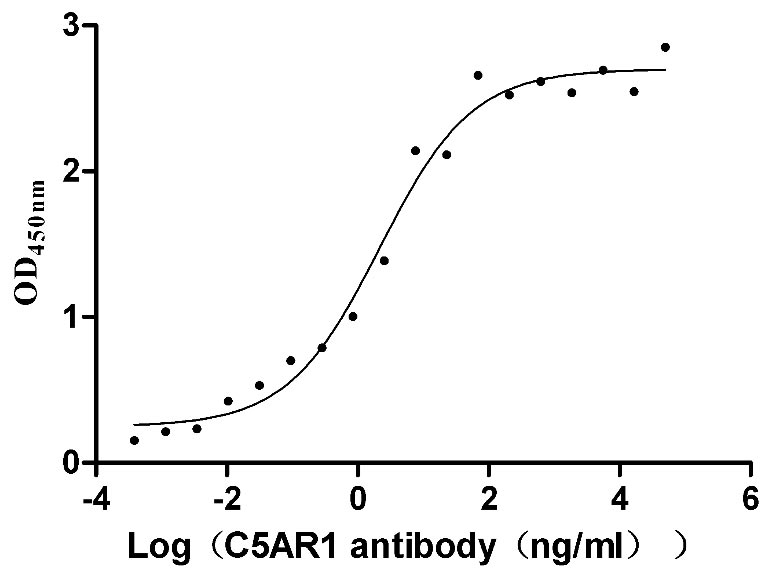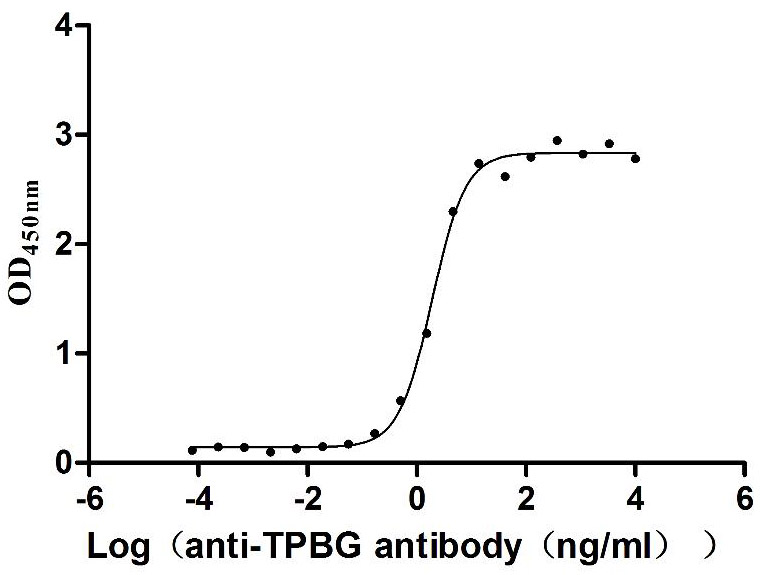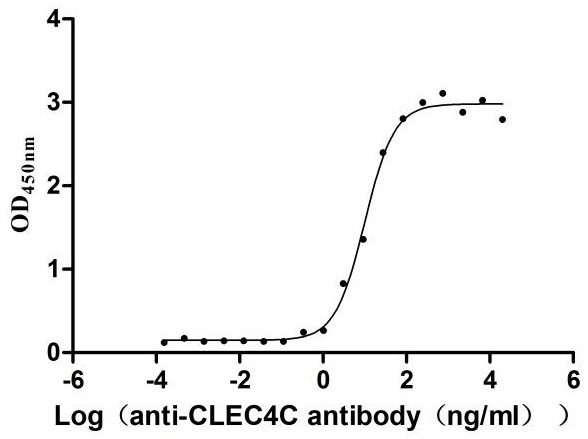Recombinant Human COP9 signalosome complex subunit 6 (COPS6)
-
中文名稱:Recombinant Human COP9 signalosome complex subunit 6(COPS6),Yeast
-
貨號(hào):CSB-YP745336HU
-
規(guī)格:
-
來(lái)源:Yeast
-
其他:
-
中文名稱:Recombinant Human COP9 signalosome complex subunit 6(COPS6),Yeast
-
貨號(hào):CSB-EP745336HU
-
規(guī)格:
-
來(lái)源:E.coli
-
其他:
-
中文名稱:Recombinant Human COP9 signalosome complex subunit 6(COPS6),Yeast
-
貨號(hào):CSB-EP745336HU-B
-
規(guī)格:
-
來(lái)源:E.coli
-
共軛:Avi-tag Biotinylated
E. coli biotin ligase (BirA) is highly specific in covalently attaching biotin to the 15 amino acid AviTag peptide. This recombinant protein was biotinylated in vivo by AviTag-BirA technology, which method is BriA catalyzes amide linkage between the biotin and the specific lysine of the AviTag.
-
其他:
-
中文名稱:Recombinant Human COP9 signalosome complex subunit 6(COPS6),Yeast
-
貨號(hào):CSB-BP745336HU
-
規(guī)格:
-
來(lái)源:Baculovirus
-
其他:
-
中文名稱:Recombinant Human COP9 signalosome complex subunit 6(COPS6),Yeast
-
貨號(hào):CSB-MP745336HU
-
規(guī)格:
-
來(lái)源:Mammalian cell
-
其他:
產(chǎn)品詳情
-
純度:>85% (SDS-PAGE)
-
基因名:COPS6
-
Uniprot No.:
-
別名:COP9 (constitutive photomorphogenic); subunit 6; COP9 complex S6; COP9 constitutive photomorphogenic homolog subunit 6 (Arabidopsis); COP9 signalosome complex subunit 6; COP9 signalosome subunit 6; COP9 subunit 6 (MOV34 homolog; 34 kD); cops6; CSN6; CSN6_HUMAN; H_NH0506M12.12; hVIP; JAB1 containing signalosome subunit 6; JAB1-containing signalosome subunit 6; MOV34 homolog; MOV34 homolog; 34 kD; MOV34-34KD; OTTMUSP00000025868; Sgn3; SGN6; Signalosome subunit 6; VIP/MOV34; Vpr interacting protein; Vpr-interacting protein
-
種屬:Homo sapiens (Human)
-
蛋白長(zhǎng)度:full length protein
-
表達(dá)區(qū)域:1-327
-
氨基酸序列MAAAAAAAAA TNGTGGSSGM EVDAAVVPSV MACGVTGSVS VALHPLVILN ISDHWIRMRS QEGRPVQVIG ALIGKQEGRN IEVMNSFELL SHTVEEKIII DKEYYYTKEE QFKQVFKELE FLGWYTTGGP PDPSDIHVHK QVCEIIESPL FLKLNPMTKH TDLPVSVFES VIDIINGEAT MLFAELTYTL ATEEAERIGV DHVARMTATG SGENSTVAEH LIAQHSAIKM LHSRVKLILE YVKASEAGEV PFNHEILREA YALCHCLPVL STDKFKTDFY DQCNDVGLMA YLGTITKTCN TMNQFVNKFN VLYDRQGIGR RMRGLFF
-
蛋白標(biāo)簽:Tag?type?will?be?determined?during?the?manufacturing?process.
The tag type will be determined during production process. If you have specified tag type, please tell us and we will develop the specified tag preferentially. -
產(chǎn)品提供形式:Lyophilized powder
Note: We will preferentially ship the format that we have in stock, however, if you have any special requirement for the format, please remark your requirement when placing the order, we will prepare according to your demand. -
復(fù)溶:We recommend that this vial be briefly centrifuged prior to opening to bring the contents to the bottom. Please reconstitute protein in deionized sterile water to a concentration of 0.1-1.0 mg/mL.We recommend to add 5-50% of glycerol (final concentration) and aliquot for long-term storage at -20℃/-80℃. Our default final concentration of glycerol is 50%. Customers could use it as reference.
-
儲(chǔ)存條件:Store at -20°C/-80°C upon receipt, aliquoting is necessary for mutiple use. Avoid repeated freeze-thaw cycles.
-
保質(zhì)期:The shelf life is related to many factors, storage state, buffer ingredients, storage temperature and the stability of the protein itself.
Generally, the shelf life of liquid form is 6 months at -20°C/-80°C. The shelf life of lyophilized form is 12 months at -20°C/-80°C. -
貨期:Delivery time may differ from different purchasing way or location, please kindly consult your local distributors for specific delivery time.Note: All of our proteins are default shipped with normal blue ice packs, if you request to ship with dry ice, please communicate with us in advance and extra fees will be charged.
-
注意事項(xiàng):Repeated freezing and thawing is not recommended. Store working aliquots at 4°C for up to one week.
-
Datasheet :Please contact us to get it.
相關(guān)產(chǎn)品
靶點(diǎn)詳情
-
功能:Component of the COP9 signalosome complex (CSN), a complex involved in various cellular and developmental processes. The CSN complex is an essential regulator of the ubiquitin (Ubl) conjugation pathway by mediating the deneddylation of the cullin subunits of SCF-type E3 ligase complexes, leading to decrease the Ubl ligase activity of SCF-type complexes such as SCF, CSA or DDB2. The complex is also involved in phosphorylation of p53/TP53, c-jun/JUN, IkappaBalpha/NFKBIA, ITPK1 and IRF8, possibly via its association with CK2 and PKD kinases. CSN-dependent phosphorylation of TP53 and JUN promotes and protects degradation by the Ubl system, respectively. Has some glucocorticoid receptor-responsive activity. Stabilizes COP1 through reducing COP1 auto-ubiquitination and decelerating COP1 turnover rate, hence regulates the ubiquitination of COP1 targets.
-
基因功能參考文獻(xiàn):
- High CSN6 expression is associated with metastasis of glioblastoma. PMID: 27546621
- The overexpression of CSN6 reduced the effect of quercetin treatment on HT29 cells, suggesting that quercetininduced apoptosis may involve the AktCSN6Myc signaling axis in HT29 cells. PMID: 27748879
- CSN6 positively regulates c-Jun in a MEKK1-dependent manner PMID: 26237449
- our results indicate that CSN6 is a positive regulator of E6AP and is important for cervical cancer development. PMID: 26318036
- CSN6 interacts with p27(Kip1) and facilitates ubiquitin-mediated degradation of p27(Kip1). PMID: 25945542
- Findings indicate that the deregulation of beta-catenin by extracellular signal-regulated kinase 2 (ERK2)-activated CSN6 protein is important for colorectal cancer (CRC) development. PMID: 26267535
- Analyses of the pseudo metal-binding motif in CSN6 suggest that the loss of two key histidine residues may contribute to the lack of catalytic activity in CSN6. PMID: 25242525
- Data suggest that CSN6 is an important negative regulator of p57 (Kip2) , and that overexpression of CSN6 in many types of cancer could lead to decreased expression of p57 (Kip2) and result in promoted cancer cell growth. PMID: 23187808
- COPS6 is a target gene of the BACH1 transcription factor according to ChIP-seq analysis in HEK 293 cells. PMID: 21555518
- loss of CSN6 enhances p53-mediated tumor suppression in vivo and CSN6 plays an important role in regulating DNA damage-associated apoptosis and tumorigenesis through control of the MDM2-p53 signaling pathway PMID: 21317535
- critical role of caspase 8 in the processing of CSN6. PMID: 17337451
- For the first time our data demonstrate that CSN-mediated deneddylation can be regulated by active Casp3 and that the CSN executes a specific function during the apoptotic process. PMID: 18060501
顯示更多
收起更多
-
亞細(xì)胞定位:Nucleus. Cytoplasm.; Cytoplasm, perinuclear region.
-
蛋白家族:Peptidase M67A family, CSN6 subfamily
-
組織特異性:Widely expressed.
-
數(shù)據(jù)庫(kù)鏈接:
Most popular with customers
-
Recombinant Human C5a anaphylatoxin chemotactic receptor 1 (C5AR1)-VLPs (Active)
Express system: Mammalian cell
Species: Homo sapiens (Human)
-
Recombinant Macaca fascicularis CD93 molecule (CD93), partial (Active)
Express system: Mammalian cell
Species: Macaca fascicularis (Crab-eating macaque) (Cynomolgus monkey)
-
Recombinant Macaca fascicularis Trophoblast glycoprotein (TPBG), partial (Active)
Express system: Mammalian cell
Species: Macaca fascicularis (Crab-eating macaque) (Cynomolgus monkey)
-
Recombinant Human Carcinoembryonic antigen-related cell adhesion molecule 6 (CEACAM6) (Active)
Express system: Mammalian cell
Species: Homo sapiens (Human)
-
Recombinant Human C-type lectin domain family 4 member C (CLEC4C), partial (Active)
Express system: Mammalian cell
Species: Homo sapiens (Human)
-
Recombinant Macaca fascicularis Transmembrane 4 L6 family member 1 (TM4SF1)-VLPs (Active)
Express system: Mammalian cell
Species: Macaca fascicularis (Crab-eating macaque) (Cynomolgus monkey)
-
Recombinant Human Tumor necrosis factor ligand superfamily member 15(TNFSF15) (Active)
Express system: Mammalian cell
Species: Homo sapiens (Human)
-
Recombinant Human Tyrosine-protein kinase receptor UFO(AXL),partial (Active)
Express system: Mammalian cell
Species: Homo sapiens (Human)








-AC1.jpg)









